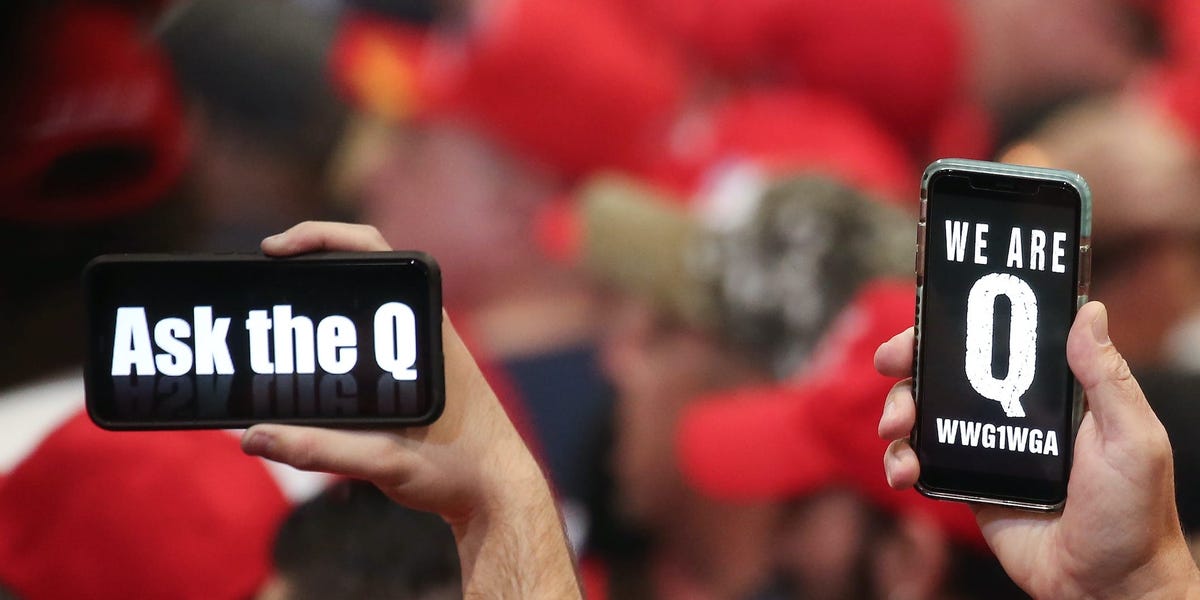QAnon, plus some progressives, spread Trump virus conspiracy theories

- Following President Trump’s announcement that he had tested positive for COVID-19, conspiracies are spreading on social media.
- QAnon supporters claimed that the president’s announcement was cover to vanish from the public eye to fight child-abusing elites.
- On Twitter there was speculation from progressives that the president’s announcement was part of a plot to win reelection.
- Visit Business Insider’s homepage for more stories.
Americans on both sides of the political divide are spreading conspiracy theories on social media about President Donald Trump’s COVID-19 diagnosis.
The president’s announcement on Twitter early Friday that he and First Lady Melania Trump had tested positive for the illness set off a flurry of speculation.
On the social media app Parler, where supporters of the QAnon conspiracy theory have congregated after being expelled from other platforms, there was widespread speculation about the meaning of the announcement.
Members interpreted the announcement as a covert message, designed to signal to them that the president is stepping out of the public eye in anticipation of what they call The Storm.
“The Storm” is the name QAnon believers give to the day when they claim that the president will take action to dismantle a network of child abusers and “deep state” agents secretly manipulating world events.
Many began searching for clues in the president’s statements, and asserted, groundlessly, that the announcement is an elaborate ruse.
But it wasn’t just parts of the conspiratorial right that interpreted the announcement as part of a secret plot.
On Twitter, there was widespread speculation, including by progressives, that the shock announcement was really part of a plot by the president to claw back an election win as polls continue to show him trailing Joe Biden, the Democratic nominee.
“Honestly, when a man lies so damn much, am I wrong to imagine another cry of wolf for an October surprise? That Trump is claiming a positive test, will present as asymptomatic, or claim himself cured with bleach, then dismiss COVID again as a Democratic hoax? I’m wrong, right?” tweeted David Simon, a screenwriter and prominent critic of the president.
Simon later said, in response to criticism, that he had been commenting on how false claims spread by Trump had encouraged an atmosphere of suspicion.
Other critics pointed to the president’s history of promoting falsehoods including the Obama “birther” conspiracy, or a visit he made to a medical center in September, as reason to be suspicious of the announcement.
No evidence has emerged to indicate that the diagnosis is fake or has been fabricated for political purposes.
Cindy Otis, a former CIA analyst, disinformation expert, and vice president of analysis at the Alethea Group, told Business Insider that rumours were spreading quickly but it was important to focus on reputable sources of information.
“This is one of those times when information is and will move rapidly, change, and come from many different sources. The President’s positive diagnosis has already launched a range of global speculation and conspiracy theories.
“The risk is that those spread so rapidly that people start treating them as fact. People should focus on what we know from reputable media outlets and sources, and stick to those, rather than sharing the more sensational or conspiracies.”
—David Simon (@AoDespair) October 2, 2020
Mike Rothschild, who monitors conspiracy theories, cast doubt on the rumours as they spread.
“The galaxy brain take is that Trump is faking COVID to get out of the debates or distract from the tax stuff. But his image depends on being a bull god street fighter Adonis who outworks men half his age. He wouldn’t pretend to be sick and weak. If anything, he’d cover it up,” he wrote.
—Charles Johnson (@Green_Footballs) October 2, 2020
—Mike Rothschild (@rothschildmd) October 2, 2020
Conspiracy theories have long been part of US political culture, with a University of Chicago study in 2014 finding that 50% of Americans believe in at least one conspiracy theory.
But Trump has made the promotion of conspiracy theories central to his political identity, and has himself repeatedly deployed misinformation during the coronavirus.
A study by experts at Stanford released Thursday finding that Trump is the world’s single most important driver of coronavirus misinformation.
A study by Pew Research in July found a partisan divide in how likely someone was to believe in the conspiracy theory that the coronavirus was deliberately spread by shadowy powerful forces, with 34% Republicans saying they believed it to be true, in comparison to 18% of Democrats.
However The New York Times reported in 2017 that Trump’s election had seen an increase in the number conspiracy theories spread by progressives. Studies have found that during periods of crisis or upheaval in society, belief in conspiracy theories becomes more prevalent.
*** This article has been archived for your research. The original version from Business Insider can be found here ***


